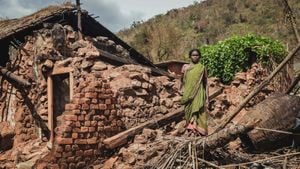Delegates at the recent COP29 climate summit ended two weeks of discussions by approving a controversial deal on climate finance—a plan to provide at least $300 billion annually to support developing nations as they fight the impacts of climate change. This agreement, reached at the summit held in Baku, Azerbaijan, is seen by many as inadequate compared to the growing needs of poorer countries facing dire climate-related challenges.
The target is meant to be realized by 2035, yet critics of the deal argue it offers little comfort to developing nations, who have been demanding approximately $1.3 trillion each year to adequately combat climate change effects. Experts indicated poorer nations will need substantial public and private investments to cope with increasing climate-related disasters. The disappointment among developing nations was palpable, with many expressing anger over how the negotiations unfolded and the outcomes produced.
COP29 president Mukhtar Babayev gavelled the agreement through at the end of discussions, but not before the frustration of several delegates became evident during the closing stages. "We find it deeply disappointing because the amount committed is extremely low. It’s just $300 billion, and then spread out over 15 years," said Harjeet Singh, global engagement director for the Fossil Fuel Non-Proliferation Treaty Initiative. "This lets developed countries off the hook."
Developing countries had contributed the least to climate change yet are the ones bearing the brunt of its effects, facing extreme weather events, rising sea levels, and other climate-induced crises. The funding is intended to bolster their transitions away from fossil fuels, adapt to climate change, and recover from damages already sustained due to climate impacts.
According to UN Climate Change Executive Secretary, Simon Stiell, wealthy nations must adhere to prior commitments to provide financial support. "Like any insurance policy, it only works if premiums are paid in full and on time. Promises must be kept to protect billions of lives," he stated. He emphasizes this funding deal is merely the beginning and not the definitive solution needed.
The deal coincided with worries about the political climate surrounding climate discussions. This includes uncertainties about the U.S. honoring its commitments, especially with the potential return of Donald Trump, who plans to shake up environmental policies again upon assuming office if he wins the presidency. "With the United States, well, the voters have voted, and that's the way it is. What they’re going to do, we do not know," said South Africa’s Environment Minister Dion George, voicing the apprehension building around American politics and its global consequences.
The atmosphere at COP29 reflected tension as representatives from smaller, developing nations protested, feeling sidelined by the focus on wealthier nations’ needs and interests. The dissatisfaction led to negotiations where some smaller nations walked out, highlighting their demands for more accessible climate funding and decision-making power.
While some wealthy nations, including the U.S., U.K., and Japan, pledged to contribute to the climate finance target, the irony of their late cooperation following years of contributing to the very emissions causing climate change was not lost on many observers. The gulf between developed nations and those vulnerable to climate issues sparked calls for reform.
The resultant funding amount, though substantial, does not accurately reflect the estimated costs associated with climate change adaptation, as many experts have stated. The proposed need of at least $1 trillion annually through 2030 to meet all climate targets starkly contrasts with the $300 billion agreement, leading many to declare it insufficient for the gravity of the situation.
The agreement also discussed enhancing carbon markets to generate necessary funds, indicating more expansions on financing mechanisms moving forward. The idea is to create additional avenues for funding, including potential international taxes, to fulfill financial obligations owed to developing nations.
Despite the mixed reactions, some delegates remained hopeful. They considered this deal as the start of improved financial commitments from developed nations, believing it could lead to more comprehensive funding streams as countries seek to meet the targets established at the Paris Agreement back in 2015.
The negotiations leading up to COP29 were viewed as complex and charged with emotion, with fostering trust between nations becoming increasingly difficult due to historical grievances and current geopolitics. With the next climate summit scheduled to take place in Brazil, observers are anxiously considering how this fragile trust can be restored as the world aims for higher ambitions for climate action.
"The Baku climate talks were never going to be smooth," noted one source within the COP29 presidency, expressing the challenges faced from multiple stakeholders expressing diverging interests. With overwhelming support required from wealthier nations, transitioning to effective climate strategies is complex, requiring more than just verbal commitments—it calls for financial accountability.
This uncertainty looms over developing nations as they struggle to make bold commitments due to insufficient funding streams. "Finance is not just charity; it’s about creating resilience and adapting to the consequences of climate change which affect us all, including those who have historically contributed less to emissions," stated U.N. Secretary-General António Guterres.
While the details of the funds and their allocations remain abstract, the expectation for clarity and follow-through is pressing. Understanding how to translate these international pledges to practical actions and investments is key for developing nations to fortify against future climate impacts.
The outcome from COP29 is seen as laying the groundwork not only for future conferences but also for global climate governance, where equitable distributions and responsible investments could gradually emerge. Amid the uncertainty and discontent, discussions continue around how to rebuild partnerships and secure meaningful commitments to share environmental burdens fairly across borders.
On the horizon of climate discussions, the path forward seems convoluted but urgent. Developing nations stand firm on their demands, encouraging the international community to reassess commitments and provide the necessary support to allow sustainable transitions grounded on equity, transparency, and accountability.



